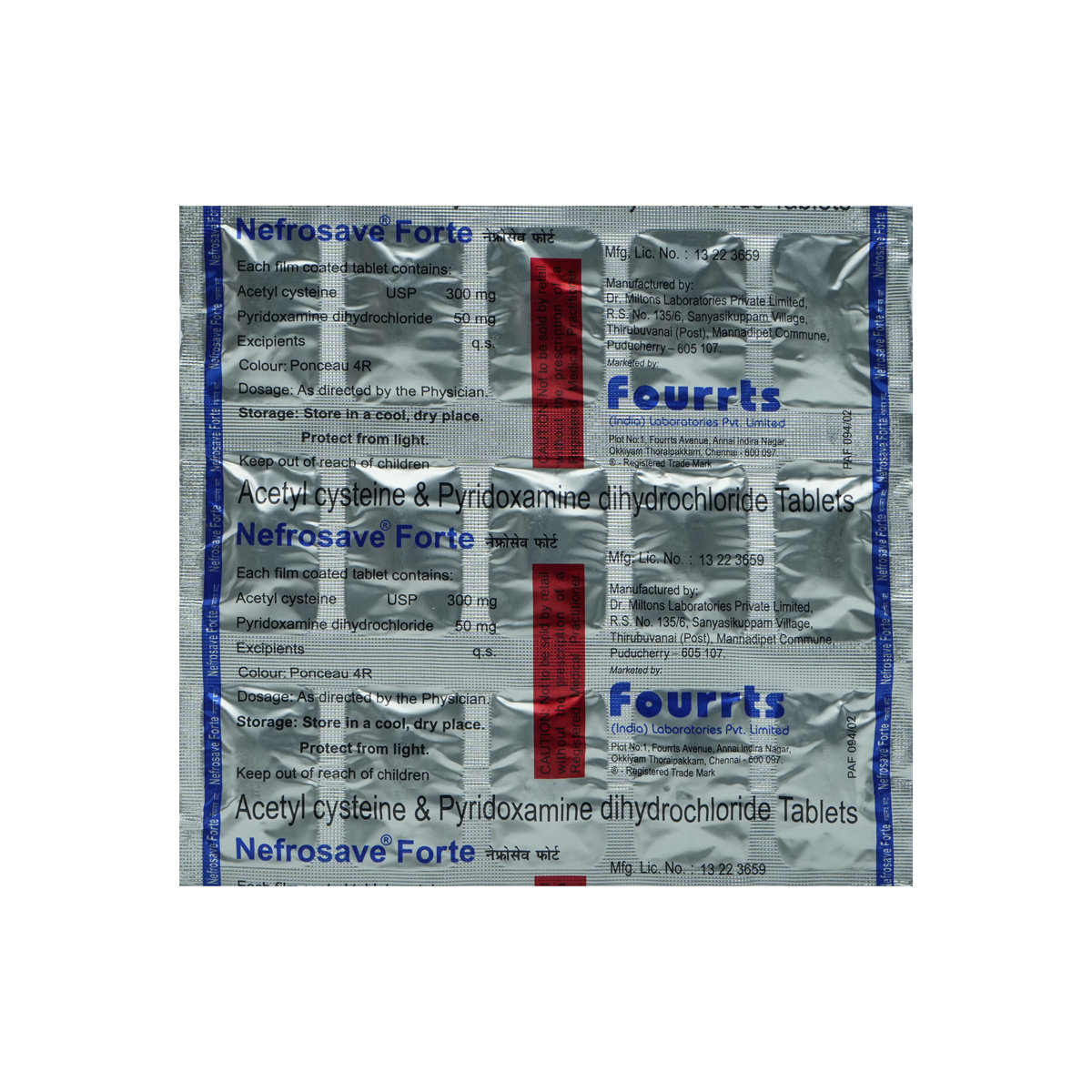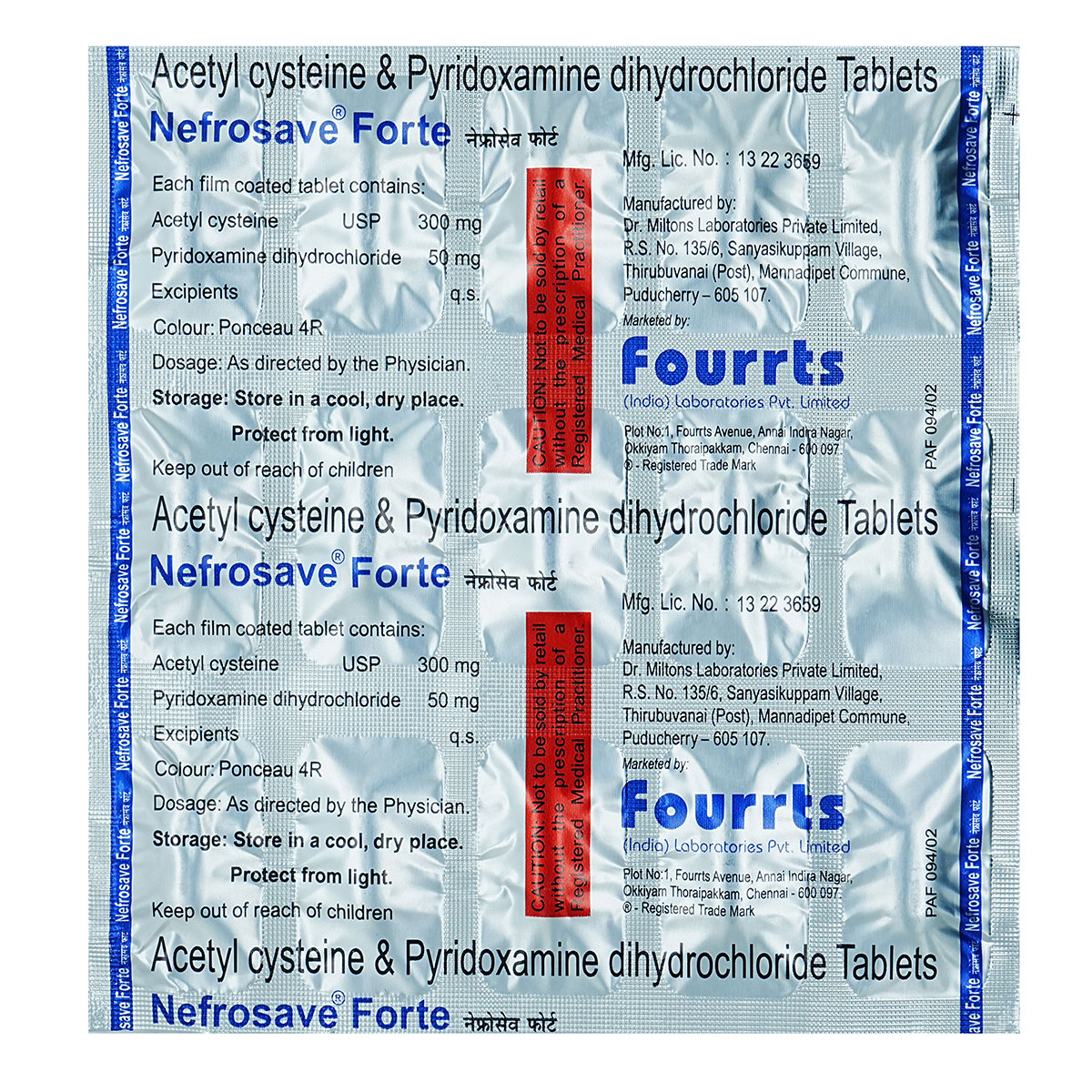Renocell Tablet 10's
MRP ₹308.5
(Inclusive of all Taxes)
₹46.3 Cashback (15%)
Provide Delivery Location
Online payment accepted
 Prescription drug
Prescription drugWhats That
Manufacturer/Marketer :
Consume Type :
Expires on or after :
Return Policy :
About Renocell Tablet
Renocell Tablet is used to treat chronic kidney disease (CKD). Chronic kidney disease is characterised by a progressive loss of kidney function over time. Kidneys remove waste and excess fluid from the blood. Waste can accumulate to dangerously high levels in the blood due to kidney disease, making you sick.
Renocell Tablet contains Pyridoxamine dihydrochloride and Acetylcysteine. Acetylcysteine acts as an antioxidant and protects body tissues in people with chronic kidney disease and those on dialysis. Pyridoxamine dihydrochloride acts as a catalyst in the metabolism of fats, carbohydrates, and proteins in the body, thereby assisting in maintaining energy balance in kidney disease patients. As a result, Renocell Tablet aids in treating chronic kidney disease.
To treat your condition effectually, continue using Renocell Tablet for as long as your doctor has prescribed it. Renocell Tablet may cause nausea, vomiting, diarrhoea, and abdominal pain in some cases. The majority of these side effects do not necessitate medical attention and will resolve gradually over time. If you are experiencing these side effects regularly, consult your doctor.
Please do not take Renocell Tablet if you are allergic to Pyridoxamine dihydrochloride, Acetylcysteine or any of its ingredients. Consult your doctor before using Renocell Tablet if you are pregnant or breastfeeding. Limited information is available regarding the usage of Renocell Tablet in children, so please consult a doctor if you have any concerns. Keep your doctor informed about your health condition and all the medicines you take to rule out any side effects.
Uses of Renocell Tablet
Directions for Use
Key Benefits
Renocell Tablet is used to treat chronic kidney disease. Renocell Tablet contains Pyridoxamine dihydrochloride (vitamin B6 derivative) and Acetylcysteine (antioxidant), which helps in various ways to prevent kidney damage or injury. Thereby it effectively improves kidney function, reducing complications in patients with chronic kidney disease.
Storage
Drug Warnings
To effectively treat your disease, continue using Renocell Tablet for as long as your doctor has prescribed it. If you have had a skin response or irritation to any medicine, do not use Renocell Tablet without consulting a doctor. Consult your doctor before using Renocell Tablet if you are pregnant or breastfeeding. Before taking Renocell Tablet , inform your doctor about your medical history and other medications you are currently taking to rule out any potential negative effects. It is unknown whether consuming alcohol with Renocell Tablet is safe. However, it is best to avoid or limit alcohol consumption as a precaution.
Diet & Lifestyle Advise
- A healthy, balanced diet lowers your risk of kidney disease. Keep your blood pressure and cholesterol at a healthy level.
- A well-balanced diet should include plenty of fruits and vegetables.
- Include starchy foods such as potatoes, wholegrain bread, rice, or pasta in your main meal.
- For a protein source, include beans or pulses, fish, eggs, or meat in your daily diet.
- Limit intake of saturated fat, salt, and sugar.
- Limit the amount of potassium or phosphate in your diet.
- Quit smoking. Avoid or limit the consumption of alcohol.
Side Effects of Renocell Tablet
- Nausea
- Vomiting
- Diarrhoea
- Abdominal pain
Habit Forming
Therapeutic Class
All Substitutes & Brand Comparisons
RX
Out of StockMeunac Forte Tablet 15's
Geneux Science Laboratories
₹319.95
(₹19.2 per unit)
30% CHEAPERRX
Nefrosave Forte Tablet 10's
Fourrts India Laboratories Pvt Ltd
₹217.5
(₹19.58 per unit)
29% CHEAPERRX
Nefrosave Forte Tablet 15's
Fourrts India Laboratories Pvt Ltd
₹374
(₹22.44 per unit)
19% CHEAPER
Author Details
We provide you with authentic, trustworthy and relevant information
FAQs
Drug-Drug Interactions Checker List
- LEVODOPA
- ISONIAZID
- ACTIVATED CHARCOAL
- PENICILLAMINE
- GENTAMICIN
- STREPTOMYCIN
- TOBRAMYCIN
- AMIKACIN
- PENICILLIN
- TETRACYCLINE
- GLYCERYL TRINITRATE
Disease/Condition Glossary
Chronic kidney disease: Chronic kidney disease, also known as chronic kidney failure, is a long-term kidney condition that results in renal failure. Kidneys remove waste and extra fluid from the blood. Renal disease is characterised by a steady decline of kidney function over time. As a result, waste can accumulate to dangerously high levels in the blood, potentially making you sick. Loss of appetite, nausea, vomiting, sleep problems, swelling of the feet and ankles are the symptoms of renal failure. Treatment focuses mostly on stopping the progression of kidney disease by addressing the underlying cause.

Have a query?
Alcohol
Safe if prescribed
It is not known if alcohol interacts with Renocell Tablet . However, it is advisable not to take or limit alcohol as a precautionary measure.
Pregnancy
Consult your doctor
Please consult the doctor. There are no adequate and well-controlled studies on pregnant women. Your doctor will prescribe only if the benefits outweigh the risks.
Breast Feeding
Consult your doctor
Consult your doctor as there is no substantial research yet on the use of Renocell Tablet in breastfeeding/nursing mothers.
Driving
Safe if prescribed
Renocell Tablet may not affect your ability to drive or use machinery.
Liver
Consult your doctor
Limited information was available about the use of Renocell Tablet in patients suffering from liver impairment. Please consult your doctor if you have any concerns. Your doctor will prescribe only if the benefits outweigh the risks.
Kidney
Consult your doctor
Renocell Tablet can be taken safely when prescribed. Usually, it does not affect the kidney.
Children
Safe if prescribed
Limited information is available regarding the usage of Renocell Tablet in children, so please consult a doctor if you have any concerns.








_0.jpg?tr=q-85)
